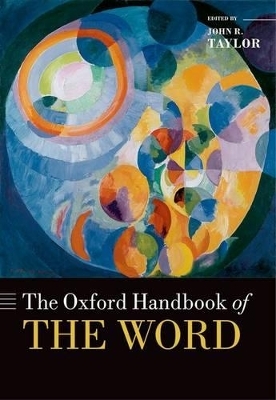
The Oxford Handbook of the Word
Oxford University Press (Verlag)
978-0-19-964160-4 (ISBN)
This handbook addresses words in all their multifarious aspects and brings together scholars from every relevant discipline to do so. The many subjects covered include word frequencies; sounds and sound symbolism; the structure of words; taboo words; lexical borrowing; words in dictionaries and thesauri; word origins and change; place and personal names; nicknames; taxonomies; word acquisition and bilingualism; words in the mind; word disorders; and word games, puns, and puzzles.
Words are the most basic of all linguistic units, the aspect of language of which everyone is likely to be most conscious. A 'new' word that makes it into the OED is prime news; when baby says its first word its parents reckon it has started to speak; knowing a language is often taken to mean knowing its words; and languages are seen to be related by the similarities between their words. Up to the twentieth century linguistic description was mainly an account of words and all the current subdivisions of linguistics have something to say about them. A notable feature of human languages is the sheer vastness of their word inventories, and scholars and writers have sometimes deliberately increased the richness of their languages by coining or importing new items into their word-hoards. The book presents scholarship and research in a manner that meets the interests of students and professionals and satisfies the curiosity of the educated reader.
John R. Taylor obtained his PhD in 1979 and was Senior Lecturer in Linguistics at the University of Otago until his retirement in 2010. He is the author of Possessives in English (1996), Cognitive Grammar (2002), Linguistic Categorization (3rd edition 2003), and The Mental Corpus (2012; paperback 2014), all published by Oxford University Press, and co-editor of the Bloomsbury Companion to Cognitive Linguistics (2014). He is a managing editor for the series Cognitive Linguistics Research (Mouton de Gruyter) and an Associate Editor of the journal Cognitive Linguistics.
Introduction ; 1. The lure of words ; 2. How many words are there? ; 3. Dictionaries ; 4. Words and thesauri ; 5. Word frequencies ; 6. Word length ; 7. Which words do you need? ; 8. Words in second language learning and teaching ; 9. The structure of words ; 10. Word categories ; 11. Words as grammatical units ; 12. Words as phonological units ; 13. The word as a universal category ; 14. Word meaning ; 15. Words as names of categories ; 16. Terminologies and taxonomies ; 17. Lexical relations ; 18. Comparing lexicons cross-linguistically ; 19. Words as carriers of cultural meaning ; 20. Multi-word idioms ; 21. Words and their neighbours ; 22. Taboo words ; 23. Sound symbolism ; 24. Etymology ; 25. How words (and vocabularies) change ; 26. Borrowing words ; 27. Lexical layers ; 28. Word associations ; 29. Accessing words ; 30. The bilingual lexicon ; 31. First words ; 32. How infants find words ; 33. Roger Brown's 'original word game' ; 34. Names ; 35. Personal names ; 36. Place and other names ; 37. Nicknames ; 38. Choosing a name: How name givers' feelings influence name selection ; 39. Words and neuropsychological disorders ; 40. Verbal humour ; 41. Word puzzles ; 42. Do words exist? And if not, why do we believe that they do?
| Reihe/Serie | Oxford Handbooks |
|---|---|
| Verlagsort | Oxford |
| Sprache | englisch |
| Maße | 171 x 246 mm |
| Gewicht | 1666 g |
| Themenwelt | Schulbuch / Wörterbuch ► Wörterbuch / Fremdsprachen |
| Geisteswissenschaften ► Philosophie ► Sprachphilosophie | |
| Geisteswissenschaften ► Sprach- / Literaturwissenschaft ► Sprachwissenschaft | |
| ISBN-10 | 0-19-964160-9 / 0199641609 |
| ISBN-13 | 978-0-19-964160-4 / 9780199641604 |
| Zustand | Neuware |
| Haben Sie eine Frage zum Produkt? |
aus dem Bereich


